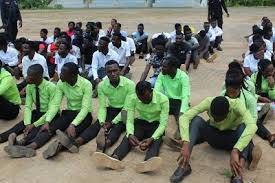Headline: Over 100 Arrested in Ghana for Post-Election Violence as Authorities Restore Order.
Introduction
Ghana's post-election landscape has been marred by incidents of violence and unrest, leading to the arrest of over 100 individuals across the country. This follows the announcement of John Dramani Mahama as President-elect after a contentious election. The Ghana Police Service has intensified efforts to maintain law and order amid heightened tensions, with support from key stakeholders advocating for peace and stability.
The Wave of Arrests
The Ghana Police Service confirmed the arrest of 106 suspects linked to various acts of violence, including the destruction of public property and attacks on political offices. The incidents occurred in different parts of the country, with hotspots reported in urban areas where political rivalries are most intense. The suspects face charges ranging from vandalism to incitement of violence, reflecting the scope of the unrest.
According to a police spokesperson, the arrests were part of a broader operation to quell disturbances and safeguard the public. “We have a zero-tolerance policy for actions that disrupt peace. The arrests send a strong message that the rule of law must be upheld,†the spokesperson stated.
Nature of the Violence
The unrest erupted shortly after the Electoral Commission declared Mahama the winner of the 2024 presidential election. Supporters of various political factions, dissatisfied with the results, reportedly engaged in violent protests, including torching vehicles, breaking into government facilities, and clashing with security personnel.
In one incident, a group of protesters stormed the Electoral Commission’s regional office in Ablekuma North, halting the collation of votes. In Sunyani, attackers targeted the Metro Mass Transit Workshop, damaging essential public transportation infrastructure.
Government and Political Responses
President Nana Akufo-Addo and the Peace Council have condemned the violence, calling for calm and urging all citizens to respect the democratic process. Former President Mahama, now President-elect, also spoke out against the unrest, emphasizing the need for unity and promising an inclusive government that addresses the concerns of all Ghanaians.
“Our democracy is too precious to be undermined by acts of violence. I appeal to all citizens, especially the youth, to channel their grievances through peaceful and lawful means,†Mahama said in a statement.
The National Democratic Congress (NDC), Mahama’s party, has also instructed its members to avoid confrontations and engage in constructive dialogue. Similarly, the New Patriotic Party (NPP) leadership has called on its supporters to respect the electoral outcome and participate in the transition process peacefully.
Police Strategy and Stakeholder Involvement
The police have deployed additional personnel to conflict-prone areas and set up rapid response teams to address emerging threats. Authorities are also collaborating with community leaders and civil society organizations to promote dialogue and reconciliation.
The Peace Council and other advocacy groups have been instrumental in organizing forums and community engagements to ease tensions. Efforts are underway to establish conflict resolution mechanisms that will prevent further incidents as Ghana navigates the post-election period.
Broader Implications
The recent arrests underscore the challenges Ghana faces in consolidating its reputation as a beacon of democracy in Africa. While the country has a history of peaceful elections, the 2024 cycle has highlighted vulnerabilities in managing political disagreements and ensuring public trust in electoral institutions.
Analysts have pointed to the need for reforms in election security and voter education to reduce the likelihood of violence in future elections. “Strengthening the legal framework and empowering law enforcement to act impartially are crucial steps,†said a political science lecturer from the University of Ghana.
Calls for Unity and Forward Momentum
As Ghana prepares for a transition to a new government, the focus remains on reconciliation and healing. Key political actors and civil society groups have urged citizens to move beyond partisan divisions and work towards the country’s development.
The arrests, while necessary for maintaining order, serve as a reminder of the underlying issues that require long-term solutions. Poverty, unemployment, and mistrust in institutions are factors that exacerbate tensions and must be addressed to prevent future conflicts.
Conclusion
The arrests of over 100 individuals for post-election violence mark a critical juncture in Ghana's democratic journey. While law enforcement's swift action has restored a measure of calm, the underlying grievances and divisions remain. The coming months will be a test of Ghana’s resilience and commitment to upholding its democratic ideals.
The government, political leaders, and civil society must work together to ensure that the nation emerges stronger from this turbulent period, reaffirming its status as a model democracy in Africa.




No comments yet
Be the first to share your thoughts!